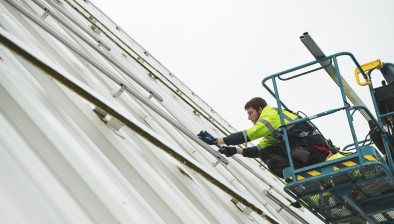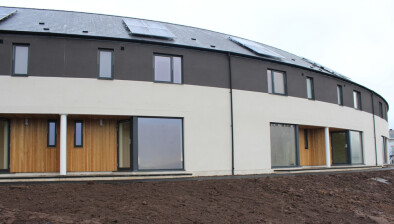Government to make improving energy efficiency of Scotland’s homes a ‘National Infrastructure Priority’

Reducing energy bills and fighting fuel poverty will be at the heart of the Scottish Government’s efforts to tackle climate change as ministers announced a comprehensive new package of measures covering transport, environment and energy.
In a statement to the Scottish Parliament, climate change minister Aileen McLeod has announced that improving the energy efficiency of Scotland’s homes and non-domestic building stock will be designated a National Infrastructure Priority.
Following a visit to a housing energy efficiency project in Dumbiedykes in Edinburgh, Dr McLeod revealed that Scotland’s Energy Efficiency Programme will provide an offer of support to all buildings in Scotland – domestic and non-domestic – to help them achieve a good energy efficiency rating over the next 15-20 years.
It will also use new powers – due to be devolved in the Scotland Bill – to determine how supplier obligations in relation to energy efficiency and fuel poverty can be better designed to better suit Scottish circumstances, as well as levering in private sector investment.
The announcement follows the publication of Scotland’s greenhouse gas emissions for 2013 which show that Scotland is on track to meet its 42 per cent emissions reduction target ahead of schedule, despite its failure to meet climate change targets for four years in a row.
The minister said: “Heating and cooling our homes and businesses costs £2.6 billion a year and accounts for approximately half of Scotland’s greenhouse gas emissions. Energy efficiency is clearly key to meeting our ambitious climate change targets which is why action on energy is a key focus as the Scottish Government step up our action on climate change.
“There is no silver bullet to tackling climate change which is why we are building on previous actions and announcing a comprehensive package of measures across a range of sectors.
“We are already making good progress and since 2008, nearly one in three households have installed energy efficiency measures to benefit from warmer homes and lower energy bills.
“The Scottish Government has already increased investment in domestic energy efficiency – from £99 million last year to £119m this year. And since 2009 we have allocated over half a billion pounds on Fuel Poverty and Energy Efficiency programmes.
“But we must do more to meet Scotland’s world-leading and ambitious climate change targets. That is why I am today announcing that improving the energy efficiency of Scotland’s buildings will be designated a National Infrastructure priority.”
Welcoming the move, Alan Ferguson, chair of the Existing Homes Alliance Scotland, said: “This announcement should lead to the step-change in ambition and scale that is required if we want everyone to live in warm, affordable and low carbon homes. Making energy efficiency a National Infrastructure Priority should, in our view, mean that the Scottish Government is working to upgrade all homes to a C energy standard by 2025.
“No other infrastructure investment can achieve so much – tackling climate change while helping pensioners, young families, students, single parents to save money on fuel bills, improve their health, and lift people out of fuel poverty. It will also create and sustain jobs in every part of Scotland – upskilling the workforce to turn our leaky, cold homes into housing that is fit for the 21st century.
“This is the only way to permanently reduce energy bills - it is also the cheapest way to decarbonise energy generation. With this infrastructure priority and multi-year capital budgets, Scotland will enjoy supply-chain confidence and attract private investment for installations, research and innovation.”
The Existing Homes Alliance believes the infrastructure priority should have multi-year budgets and aim to achieve a high energy performance standard for all housing - the Energy Performance Certificate (EPC) band C – or above by 2025. This means at least 127,000 homes would be upgraded every year.
The Alliance said that yesterday’s emissions figures which show that residential emissions are flat lining is “disappointing” and proves that the infrastructure priority will need substantially more resources to make sure housing emissions are consistently going down.
Alan Ferguson added: “The Existing Homes Alliance looks forward to working with the Scottish Government on developing the detail of this national infrastructure priority so it can fulfil its potential and meet the needs of householders today and in the future.”
The announcement was also welcomed by the Energy Saving Trust.
Mike Thornton, director, Scotland, Energy Saving Trust said: “Energy efficiency is the best way to reduce carbon emissions from buildings, lower the cost of energy bills for ordinary households and make homes warmer, healthier and more comfortable. The significant increase in energy efficiency activity implied by today’s announcement will help to contribute to economic growth across Scotland and create and maintain jobs in every part of the country. We look forward to continuing to work with the Scottish Government to deliver energy efficiency programmes in Scotland.”
The Scottish Green Party has called on the Scottish Government to be bolder in their policy actions and increase its housing and transport ambitions.
Patrick Harvie, Scottish Green MSP for Glasgow, said the commitment to national action on energy efficient homes is a policy championed by Scottish Green MSPs for over a decade.
Patrick said: “Scottish ministers have been resisting Green proposals for ambitious action for years and only now after four failed targets appear to be catching up with the need to pursue policies that make our country greener and fairer.
“My colleague Alison Johnstone secured an agreement from deputy first minister John Swinney last November on our longstanding policy that energy efficient homes should be a national infrastructure priority to cut bills, cut emissions and create jobs. We pursued this during the last budget process, resulting in an increase of £20m but it’s nowhere near enough.
“On transport, while the minister says she has sought opportunities, her government’s track record shows the opposite. Their policy on scrapping air passenger duty would increase emissions by 60,000 tonnes a year. And they still only spend one per cent of the transport budget on walking and cycling infrastructure.
“On energy we know that even if the Scottish Government meets its targets on renewables, only three per cent will be community or locally owned, limiting the creation of revenue for investing in local low-carbon economies.
“(Yesterday’s) statement is the latest in a long line of paper promises and yet more small scale pilot projects when we already know what needs to be done.”













